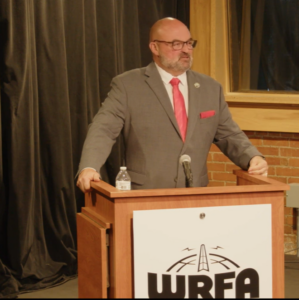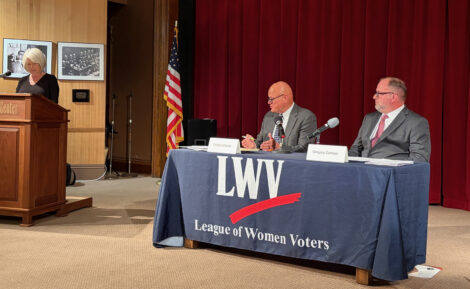Assembly GOP Takes Another Swing At Plan To Help Businesses

Assembly Republicans are trying one more time to pass the Small Business Emergency Recovery Act of 2020.
The legislation was originally introduced as an amendment to state budget legislation but was defeated, 88-53, despite Democrats Brian Barnwell, D-Maspeth, David Buchwald, D-White Plains, Pat Burke, D-South Buffalo, Marianne Buttenschon, D-Utica, Judy Griffin, D-Rockville Centre, Aileen Gunther, D-Middletown, Billy Jones, D-Plattsburgh, Karen McMahon, D-Williamsville, Angelo Santabarbara, D-Amsterdam, Steve Stern, D-Dix Hills, Albert Stirpe, D-Syracuse, Monica Wallace, D-Cheektowaga, and Carrie Woerner, D-Saratoga Springs, choosing to vote with Republicans in favor of the amendment. The Republicans then chose to reintroduce the Small Business Emergency Recovery Act of 2020 as standalone legislation after the budget vote, with Assemblyman Will Barclay, R-Fulton and Assembly minority leader, reintroducing the bill last week. It has been referred to the Assembly’s Small Business Committee.
Assemblymen Andrew Goodell, R-Jamestown, and Joe Giglio, R-Gowanda, are listed as co-sponsors.
“Our objective is to restart the economy as soon as we can consistent with public safety concerns and appropriate protocols as outlined by the CDC and by OSHA,” Goodell said.
The legislation would require, among other things, that Gov. Andrew Cuomo direct all unallocated settlement funds in the “economic uncertainties” fund and any further settlement money that may be received by the state to small business relief purposes, establishes the small business and not-for-profit recovery loan program, requires that the Empire State Film Production Credit be used to help small businesses hurt by COVID-19 closures from 2020 through 2024, authorizes the governor to repurpose funding from the state’s Urban Development Corporation, Environmental Facilities Corporation, Dormitory Authority of the State of New York, New York State Energy Research and Development Authority and all other state resources, grants an automatic extension for small businesses affected by an emergency declaration, provides a regulatory amnesty period for small businesses and pushes the state’s bag waste reduction bill to Sept. 1.

Much like a plan proposed by state Sen. George Borrello, R-Sunset Bay, to delay payments businesses make to the state as a way to give businesses the cash flow they need to make it through the COVID-19 pandemic rather than to give them state money, Goodell said Assembly Republicans also tried to find a way to repurpose existing spending to help businesses.
That is why Republicans looked to unallocated settlement funds that have been received by the state in past years as their funding mechanism. Using money already received and not already budget avoids creating spending holes in next year’s budget when those revenues don’t reoccur.
“The challenge we have when you’re trying to jump start the economy is the governor’s shutdown of the economy has put the state’s revenues into a freefall,” Goodell said. “The state typically relies on income taxes, sales taxes and business taxes to fund its operations. When the governor shut down the economy statewide sales tax revenues, income tax revenues and business tax revenues dropped off a cliff. That makes it extraordinarily difficult for the state to fund recovery efforts. Unlike the federal government, the state is required by the state Constitution to have a balanced budget. We can’t borrow for operating expenses. This is a source of funding that already exists that we think should be tapped into to restart the economy for a one-time emergency use.”
Reprogramming underused funding is also why Republicans targeted the $420 million film tax credit. Several Republicans asked questions of Democrats during budget deliberations about the need for the film tax credit during a time when the state was struggling to close holes in the budget created by the COVID-19 pandemic. Republicans’ concerns centered on the temporary nature of economic impact created by the film tax credit projects while wondering if Hollywood needed subsidies to film in New York state.
“I’d rather see the tax credit repurposed to help businesses that are making a permanent investment in the New York state economy and are going to be here more than the length of time it takes to produce one movie,” Goodell said.








